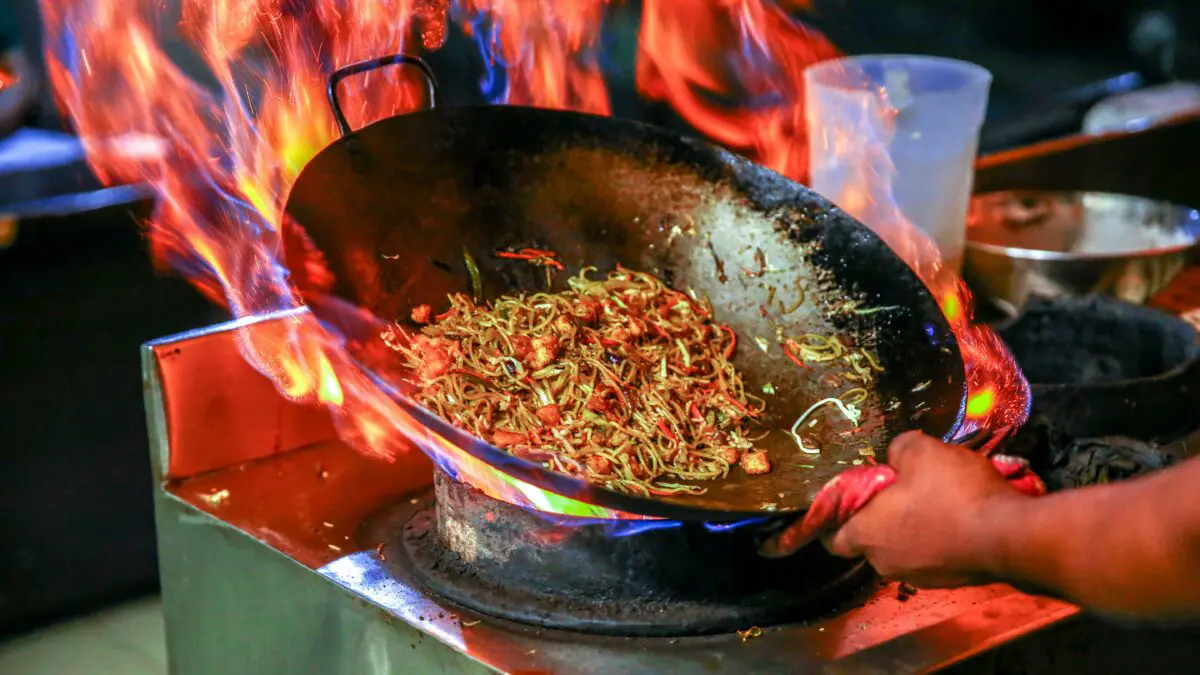The English language is full of idioms related to cooking and baking. Don’t restrict these sayings to the kitchen, though. Cooking idioms can be used pretty much anywhere in everyday life.
The most important thing about English idioms is understanding their meaning so you can use them correctly. This list has you covered, with each idiom including a definition and example sentence, so let’s get cooking!

Cooking idioms
Cooking on gas
Cooking on gas is a fun way of saying that someone is doing a great job or progressing very well.
“I love the way you’re playing the piano – you’re really cooking on gas now.”
“We hit a stumbling block last week but now we’re cooking on gas.”
You can use another version of this saying – now you’re cooking – to mean the same thing. When you say this, the emphasis is on ‘now’, suggesting that the person may have been struggling with the task before but is now doing well.
Cook up a storm
When you cook up a storm, you create something amazing from food.
“She’s been in the kitchen all day cooking up a storm.”
A similar phrase is to whip up a storm – but this can be used to talk about more than just preparing food.
Don’t confuse these with another storm idiom, kick up a storm, which means to create a fuss or disturbance.
What’s cooking?
The saying what’s cooking is a casual way of asking what’s happening, what’s going on, what’s new?
“Hey guys, I haven’t seen you in ages. What’s cooking?”
Of course, if this cooking idiom was used in the kitchen, you may very well be enquiring about the meal being prepared!
Your goose is cooked
What a great combination of a bird idiom and an expression about cooking! Sadly though, if your goose is cooked it means that you are doomed, ruined, or finished, especially if you are facing the consequences of something you have done.
“Now the boss has found out about the issues with Eli, I think his goose is cooked.”
Too many cooks in the kitchen
This term is usually used in a work context when you have multiple people working on a project. If you feel that it would run more smoothly with fewer people on the team, you could say that there are too many cooks in the kitchen.
“I didn’t mind it when there were only three of us, but now we are ten, I feel like there are too many cooks in the kitchen.”
Too many cooks spoil the soup/broth
This proverb is very similar to the cooking idiom above. When too many people are involved in something, rightly or wrongly, the task may not be successful. In this case, you could comment that too many cooks spoil the broth.
“Honestly, this team is too big and too many cooks spoil the broth.”
Cook the accounts/books
This is one of the cooking idioms that you definitely shouldn’t do! Cooking the accounts or books means falsifying financial records for a business or person. We prefer ‘cook the books’ for its alliteration!
“I’m 90% certain that Steve was cooking the books.”
There are plenty of other accounting terms that will help improve your business English, including many more finance idioms.

More cooking and baking idioms
Flash in the pan
Someone or something is described as a flash in the pan when their success is quick and short-lived. They may gain a lot of attention for a short while, but then their future efforts fall short of expectations.
“That pop star was just a flash in the pan. I don’t think we’ll hear any other hits from him.”
Discover some more success idioms here.
Boil something down (to something)
When you boil a liquid, it bubbles, gives off steam, and reduces in volume. So, when you boil something down, you get to the core, essential elements of the matter.
“Ok team, what it boils down to is that there isn’t enough money for the summer party.”
“If we boil this down, we find that most of the problems stem from Jennie leaving the team.”
“Your resume is way too long. Boil it down to the main points your prospective employer wants to know about you.”
Boil over
When something boils over, it isn’t a good thing. In the kitchen, it means the liquid is bubbling so much that it has spilled over the top of the pan, and you have a mess to clean up.
As a cooking idiom, it means someone’s feelings of anger have become so intense that they have lost their temper or gotten out of control.
“Thankfully, the argument didn’t boil over into a fight.”
“The meeting boiled over when Adam mentioned the pay dispute.”
This anger idiom can also apply to a general situation, as seen in the second example above.
On a knife-edge
If you think of how thin a knife-edge is, you can understand why this saying is describing a finely balanced, stressful situation where the outcome could easily be one of two extremes (good or bad).
“After submitting my business proposal, I’ve been on a knife-edge waiting to hear their response.”
This is a good idiom to describe stress, worry, anxiety, or fear of an unknown result.
Half-baked
If something is not properly thought through or is badly planned, you could describe it as half-baked. This is likening it to a cake that has only been cooked for half the required time.
This baking idiom can apply to all kinds of things: ideas, events, creations, inventions, and more.
“The art fair was a bit half-baked, if you ask me.”
A lot on your plate
When you need to explain to someone that you are busy and have a lot of work to do, tell them you have a lot on your plate. This is a very popular British idiom.
“I’d love to come round today but I have a lot on my plate at the moment.”
You can use this in the opposite way, too. If you have a lot of free time or not much going on, you don’t have much on your plate.
Out of the frying pan (and) into the fire
This is an easy cooking idiom to imagine visually. Jumping out of the frying pan into the fire means moving from a bad situation to an even worse one.
“I’ve really jumped out of the frying pan and into the fire by changing courses halfway through the school year.”
This is just one of many idioms about fire in English.
Stir the pot
A lot of these cooking idioms have negative meanings, and stir the pot is no expectation. This is when you deliberately cause trouble by doing or saying something you know will cause unrest.
“I think Shelia was really stirring the pot by asking about James’ ex-wife.”
You may also hear this described as stirring things up or stirring up trouble.
Simmer down
Simmer down is another way of saying ‘calm down’ or ‘settle down’. Simmering is more gentle than boiling, with less heat applied.
“Ok kids, that’s enough! Simmer down.”
There are some more calming idioms you could use in this kind of situation.
Grill someone
You’ll hear this expression when one person is questioning or interrogating another. When you grill someone, you ask them a lot of questions relentlessly and put them under pressure to give the information you want.
“Gosh, she’s been grilling me all day trying to find out about the surprise party!”
Similarly, a grilling is a long or persistent interrogation.
Turn up the heat
When you turn up the heat on a person or situation you intensify the pressure or try even harder to make someone do something (normally for your benefit). With that said, it can also just refer to increased effort or exertion, especially in a competition.
“Look at the sprinter go – she is really turning up the heat now.”
“The police officer turned up the heat in an attempt to discover the truth.”
From baking to items you find in a kitchen, we hope you enjoyed this list of cooking idioms. Next, why not check out some idioms about food? You might be surprised how many there are.



proverb is very similar to the cooking idiom above. When too many people are involved in something, rightly or wrongly, the task may not be successful. In this case, you could comment that too many cooks spoil the broth. doing the nice brief of all cooking method.